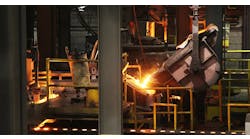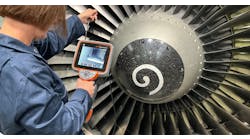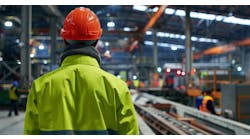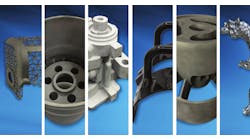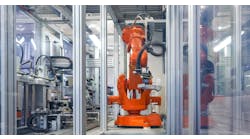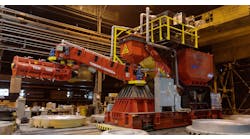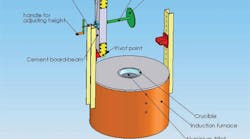Engineers at England’s University of Birmingham are developing new casting process they anticipate will reduce energy costs by up to one third for aluminum foundries. The CRIMSON (Constrained Rapid Induction Melting Single Shot) process ensures that the exact amount of aluminum needed for a particular casting is melted rapidly in a crucible, using induction heating. It transfers the crucible into an up-casting station for a highly controlled filling of a mold against gravity. The liquid metal is pushed up into a mold with a piston controlled by hydraulic motors linked back to computers that accurately control filling of the casting
Currently, a typical aluminum foundry melts between 100 kg and several metric tons of alloy in a range of furnace types. This liquid metal is held at about 700ºC in a holding furnace before it is transferred to a ladle and poured into a mold. It can take roughly eight hours for the liquid metal in a batch to be used up, and any leftover metal is poured off to be re-used or scrapped for re-melting or refining in a secondary processing plant.
The traditional approach uses energy to melt and keep the batch at temperature, heat the pouring ladle, and melt the unused metal so it can be recycled or scrapped.
Quality issues may develop when the liquid metal reacts with hydrogen, oxygen, and water in the atmosphere. An oxide surface layer is created that becomes mixed in during pouring, resulting in tiny particles or layers of metal oxide, which reduce the quality of the liquid metal, leading to degraded mechanical properties of the finished castings.
CRIMSON holds the liquid aluminum for a minimal amount of time to reduce energy losses incurred when holding metal at temperature, and removing the need for degassing as other elements from the atmosphere are not absorbed nor are thick layers of oxide allowed to form. This is the basis of the new process’ claim to reduce energy usage. Also, the castings produced are of a higher quality, leading to a reduced scrap rate and decreased re-melting energy costs.
The energy efficiency of the casting process has never been investigated fully, so a new research project run by the University of Birmingham’s School of Mechanical Engineering aims to identify the energy used in traditional foundry processes and compare it with the new process.
Dr. Mark Jolly, the lead investigator from the university’s School of Mechanical Engineering, says, “At the moment in the U.K., we use the equivalent of every man, woman, and child each boiling a kettle twice a day every day of the year just to melt the aluminum for casting. It is hoped that the new process will be able to reduce this energy usage by one third.’
He continues, “From an industrial point of view any understanding of the relationship between processing and energy usage is of benefit to both the process engineer and designer in today’s climate of sustainability. By measuring the energy usage of the traditional processing methods we will be able to gain a better insight into how energy can be saved. Our new casting technique will provide an alternative and more energy-efficient processing route for foundry designers and engineers.”
Initially, CRIMSON will be aimed at high-end specification components, e.g., those used in aerospace and automotive industries. Also, the method would be suitable for prototyping, because if a manufacturer wanted to compare two different alloys to make a component, there would be no need to clean out the furnace. A slug of the new material could be melted as needed. The process would suit other metals such as magnesium and copper, but the temperature capabilities mean it is not yet suitable for iron or steel.
Dr. Jolly has received a grant of ≤526,000 from the Engineering and Physical Sciences Research Council (EPSRC) to carry out the benchmarking research project. The total value of the project, including partner contributions, is ≤800,000. Partners in this project include the Cast Metals Federation, the U.K.’s Resource Efficiency Knowledge Transfer Network, Ntec, Ford Motor Co., Grainger & Worral, Aeromet International, and Federal Mogul Nurenberg GmbH.
The energy used in each step of a variety of processes in different types of casting, such as permanent diecasting, gravity diecasting, low-pressure diecasting, sand casting ,and investment casting, will be monitored using equipment such as Watt meters and thermocouples.

